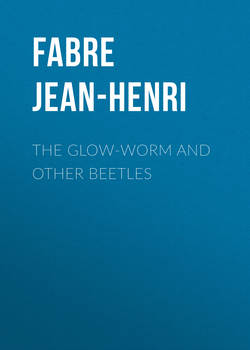The Glow-Worm and Other Beetles

Реклама. ООО «ЛитРес», ИНН: 7719571260.
Оглавление
Fabre Jean-Henri. The Glow-Worm and Other Beetles
TRANSLATOR'S NOTE
CHAPTER I. THE GLOW-WORM
CHAPTER II. THE SITARES
CHAPTER III. THE PRIMARY LARVA OF THE SITARES
CHAPTER IV. THE PRIMARY LARVA OF THE OIL-BEETLES
CHAPTER V. HYPERMETAMORPHOSIS
CHAPTER VI. CEROCOMÆ, MYLABRES AND ZONITES
CHAPTER VII. THE CAPRICORN
CHAPTER VIII. THE PROBLEM OF THE SIREX
CHAPTER IX. THE DUNG-BEETLES OF THE PAMPAS
CHAPTER X. INSECT COLOURING
CHAPTER XI. THE BURYING-BEETLES: THE BURIAL
CHAPTER XII. THE BURYING-BEETLES: EXPERIMENTS
CHAPTER XIII. THE GIANT SCARITES
CHAPTER XIV. THE SIMULATION OF DEATH
CHAPTER XV. SUICIDE OR HYPNOSIS?
CHAPTER XVI. THE CRIOCERES
CHAPTER XVII. THE CRIOCERES (continued)
CHAPTER XVIII. THE CLYTHRÆ
CHAPTER XIX. THE CLYTHRÆ: THE EGG
Отрывок из книги
Few insects in our climes vie in popular fame with the Glow-worm, that curious little animal which, to celebrate the little joys of life, kindles a beacon at its tail-end. Who does not know it, at least by name? Who has not seen it roam amid the grass, like a spark fallen from the moon at its full? The Greeks of old called it [Greek: lampouris], meaning, the bright-tailed. Science employs the same term: it calls the lantern-bearer, Lampyris noctiluca, LIN. In this case, the common name is inferior to the scientific phrase, which, when translated, becomes both expressive and accurate.
In fact, we might easily cavil at the word "worm." The Lampyris is not a worm at all, not even in general appearance. He has six short legs, which he well knows how to use; he is a gad-about, a trot-about. In the adult state, the male is correctly garbed in wing-cases, like the true Beetle that he is. The female is an ill-favoured thing who knows naught of the delights of flying: all her life long, she retains the larval shape, which, for the rest, is similar to that of the male, who himself is imperfect so long as he has not achieved the maturity that comes with pairing-time. Even in this initial stage, the word "worm" is out of place. We French have the expression "Naked as a worm," to point to the lack of any defensive covering. Now the Lampyris is clothed, that is to say, he wears an epidermis of some consistency; moreover, he is rather richly coloured: his body is dark brown all over, set off with pale pink on the thorax, especially on the lower surface. Finally, each segment is decked at the hinder edge with two spots of a fairly bright red. A costume like this was never worn by a worm.
.....
My hand is not so steady nor my sight so good as once they were, but, as far as they allow me, I consult anatomy for the structure of the luminous organs. I take a scrap of the epidermis and manage to separate pretty neatly half of one of the shining belts. I place my preparation under the microscope. On the skin, a sort of white-wash lies spread, formed of a very fine, granular substance. This is certainly the light-producing matter. To examine this white layer more closely is beyond the power of my weary eyes. Just beside it is a curious air-tube, whose short and remarkably wide stem branches suddenly into a sort of bushy tuft of very delicate ramifications. These creep over the luminous sheet, or even dip into it. That is all.
The luminescence, therefore, is controlled by the respiratory organs and the work produced is an oxidization. The white sheet supplies the oxidizable matter and the thick air-tube spreading into a tufty bush distributes the flow of air over it. There remains the question of the substance whereof this sheet is formed. The first suggestion was phosphorus, in the chemist's sense of the word. The Glow-worm has been calcined and treated with the violent reagents that bring the simple substances to light; but no one, so far as I know, has obtained a satisfactory answer along these lines. Phosphorus seems to play no part here, in spite of the name of phosphorescence which is sometimes bestowed upon the Glow-worm's gleam. The answer lies elsewhere, no one knows where.
.....